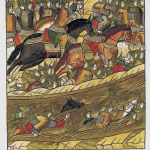One of the more fascinating personages of times past was Henry of Navarre, a ne’er-do-well and free thinker who became king of the French during the religious wars of the 1500s. It was right after the Reformation, and society was rather tense, as seemed always to be the case when religious reformation broke out. The Protestants hated the Catholics. The Catholics hated the Protestants. This was nothing new, but in France, the hatred was so intense that people killed each other by the thousands for over 30 years.
It should be noted that, religion aside, everyone involved was French, everyone spoke the French language, everyone ate baguettes, but if you believed in the wrong number of sacraments or had ornaments in your churches, you were bad, pure and simple — so bad, in fact, that you needed to be tortured and killed.
Henry of Navarre was a Protestant. For a while, then he became a Catholic. For another while, then he got excommunicated twice and became a Protestant again. And finally, just to put the proverbial icing on the cake, he converted back to Catholicism. He called his last conversion a small price to pay to keep Catholic Paris happy in the new tolerant France that he intended to govern.
All this was accomplished, albeit slowly, through the enacting of the Treaty of Nantes, which flawed though it was, did permit Protestants some degree of religious freedom in France. With this feat, decades of assault and battery, murder and bloodshed, came more or less to an end. And while the former combatants never got to peaceful coexistence, they were able to manage in a segregated fashion which was as good as could be expected in 16th century France.
There may be ideas worth dying for, but Henry didn’t think religion was one of them. Which is why it’s rather ironic that he met his end at the hands of someone who did. In 1610, some dozen years after establishing peace in the realm, he was fatally stabbed by a Catholic monk who was angry with Henry for not being sufficiently intolerant of Huguenots.
And so it goes. More than 400 years later, our mutual hatred is just as great, although now it’s for political rather than purely religious reasons. If there is any lesson to be learned it is this: beware of ideology. It can never be appeased.
Image credit: Jacob Bunel, Public domain, via Wikimedia Commons





